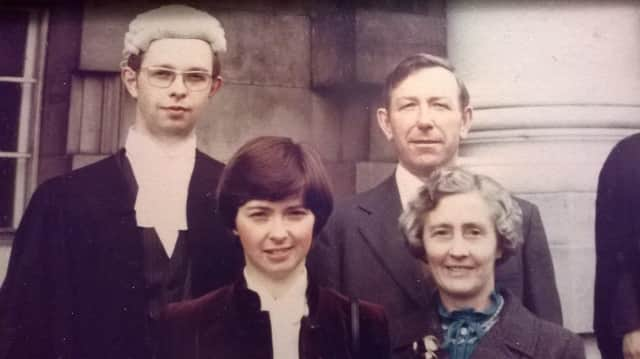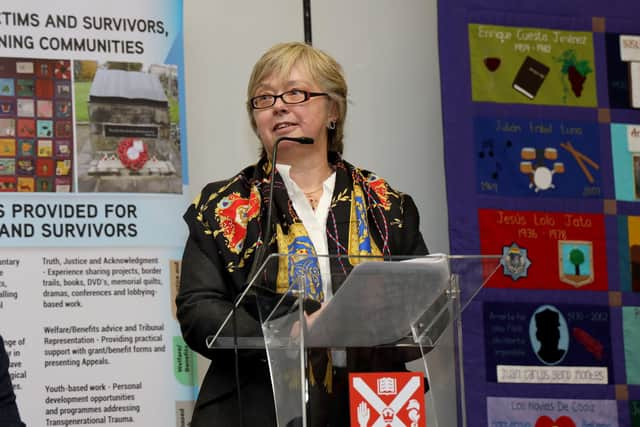Anne Graham: The BBC reported that a unionist politician had been shot at Queen's University Belfast - I thought it had to be Edgar


He had joined the Young Unionists and started to develop his debating and public speaking skills. After graduation from Queen’s (QUB) he went to Oxford and whilst there he became involved with the Conservative Party becoming friendly with Andrew Tyrie, Chris Patten and John Patten among others.
In 1979 Edgar came back to a post in Public (Constitutional Law) at Queen’s and in September 1980 was called to the Bar. He began to establish a reputation as a scholar through his learning and thoroughness in research – per Prof Greer.
Advertisement
Hide AdAdvertisement
Hide AdHe soon became chairman of the Young Unionists and spoke at Unionist Associations across N Ireland. That was how he built his reputation. Newspapers then covered local affairs more .The regular reporting built Edgar’s profile. Before long he became honorary secretary of the Ulster Unionist Party. This heightened his profile and his evident ability and charisma led to participation in a number of debates and public meetings on various aspects of policy, most notably on the devolution issue.


Edgar’s expertise in constitutional law was to lead him in the political field towards arguing for devolution of power to Stormont, more or less directly opposed to party policy of integration. He joined the Ulster Devolution Group (UDG) which included William Craig and David Trimble. The arguments were a significant divisive force within unionism in the early 1980s.
Edgar was not a natural fit within a party where membership of the loyal orders was almost a prerequisite. He was pressed to join the Orange Order with suggestions that would help his career but declined on principle.
At the Conservative Conference for 1981 Edgar was part of a delegation representing the Ulster Unionist Council. He spoke in a debate on combating terrorism. Hazel Bradford also spoke and both received a friendly reception. They met Mrs Thatcher at an evening reception and were able to put their case directly to her.
Advertisement
Hide AdAdvertisement
Hide AdAt meetings including one in 1982 when he addressed Gilnahirk and Dundonald Ulster Unionists Edgar said that he had no problems with having Catholics in government, as long as the legitimacy of the Union was recognised.
Edgar was himself elected for South Belfast as a member of the Prior Assembly. He had in fact decided not to stand for election but was called back from a conference in Salzburg when our father had a heart attack. The UUP leader Jim Molyneaux talked him in to standing. A major part of Edgar’s short political career was then spent espousing the use of supergrass evidence to put terrorists behind bars. This was not popular with an element in the party who were close to paramilitaries. Edgar told me of ducking and diving by some members when there were votes to promote law and order.
Edgar often felt uncomfortable in the party. By far the most difficult time was to come. As most with interest already know threats were made by republicans and loyalists because of Edgar’s support of the supergrass system and lack of support for segregation in prisons.
By early December Edgar felt very threatened. He had offered his resignation as Home Affairs spokesman because of the issues in the party but Molyneaux persuaded him to stay on.
Advertisement
Hide AdAdvertisement
Hide AdThus on December 7 Edgar was preparing to leave Belfast the next day for meetings in London getting away from the threats, from Queen’s, to be with people he trusted. We had spent the weekend together browsing antiques even though I needed to work for my finals the following week. So glad I did – Edgar needed support. I agreed to drive him to the airport. I could so easily have said, no, I don’t have time, take a taxi. How thankful I am that I did not, but that journey never happened.
That morning Edgar left happy that he would soon be away. I felt awful. I was studying at a table in my bedroom. About 10.45am I stood up and began pacing the room. I couldn’t understand the feeling of dread overwhelming me. l put the radio on for the 11am news to break this state of mind. And that was the ending of the world up to then. The headline news – a unionist politician had been shot at Queen’s. It had to be Edgar. Before I was able to find out the BBC had announced Edgar’s death.
Friends questioned the BBC on this – they considered it too big a story to be concerned about family. Young journalists have been shocked and horrified by this – contrary to their ethical training. This BBC attitude continues – two instances this year alone.
I went down to University Square to look after my brother. His covered body lay on the street. The RUC superintendent was very kind. He persuaded me not to go to the body. He advised that the body would go to the mortuary and that a law lecturer who had been in the police could do the formal identification. I agreed and remain grateful to Brian for this final service sparing my father or myself from that ordeal.
Advertisement
Hide AdAdvertisement
Hide AdI remember worrying about whether Edgar’s coffin would have to be closed and whether my mother could survive the horror if so. Thankfully his face was undamaged. The gunman shot Edgar in the back of the head at close range. He probably had no idea what was happening.
His blood-soaked clothes in a bad state were delivered to our home in a black bin bag by a police officer. Thankfully people came to me rather than my parents; forever grateful to Hillis for taking care of this.
That night around midnight I walked the streets and avenues with my dog fighting the anger that I had to suppress whilst taking care of the practicalities. Yet I have never known what it is to want to murder in revenge.